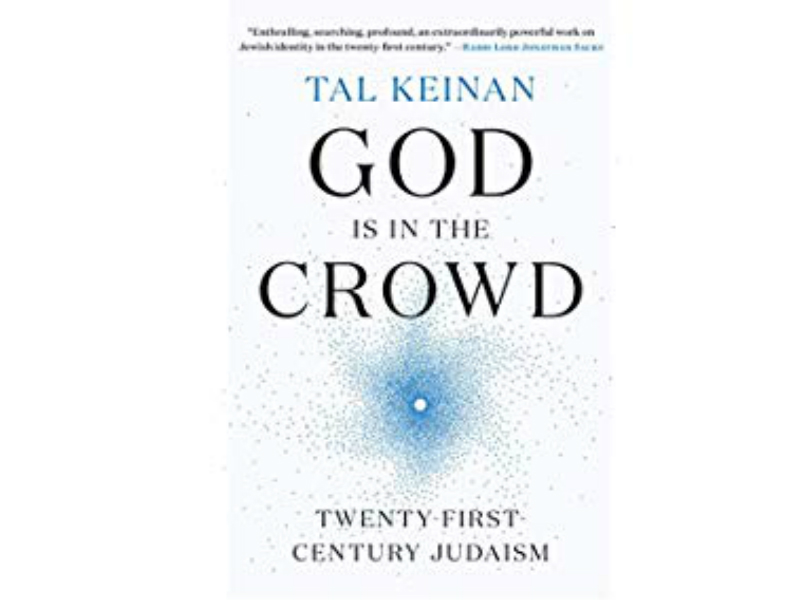Tal Keinan is a bright and successful businessman who’s the co-founder of Clarity Capital, an asset management firm with offices in New York and Tel Aviv. He splits his time between Israel and the United States. This fall, he published his first book, God is in the Crowd: Twenty-First Century Judaism.
Despite the title, the book has little to do with God. It’s actually two separate books that are blended together clumsily. The first is the story of Keinan’s life and the second is Keinan’s prescription for the future of Judaism and the Jewish people.
Keinan’s description of his life so far (he is 49 years old) is fascinating and not overly self-absorbed. He was born into an affluent secular Jewish family in the United States. Growing up, he had very few positive Jewish experiences, until, ironically enough, his divorced parents shipped him off to a fancy boarding school. The school offered Friday night dinners to their Jewish students, presided over by a Christian clergyman who tried to construct programs with positive Jewish messages for the students – and apparently succeeded.
As a young man, Keinan ended up in Israel almost by accident, enlisted in the Israel Defence Forces and was invited to try out to become a pilot in the air force. Very few enlistees are even granted a chance to compete for this coveted position, and most of those who enter the gruelling training fail. Despite having imperfect Hebrew and an American accent (at least at the beginning), he overcame the hurdles and became an active fighter pilot and an officer.
He went on dangerous and sometimes controversial bombing expeditions, such as eliminating terrorists hiding in densely populated areas like Gaza. Keinan brings us behind the scenes to hear the sincere and difficult discussions that took place among the pilots and their commanders about the permissibility of collateral damage and the issue of “proportionality.”
READ: ESSAY COMPILATION GIVES TASTE OF TORAH EDUCATOR’S STYLE
Grafted onto this autobiography is Keinan’s prescription for solving the problems of world Jewry. Over the years, he has learned about the strengths and weaknesses of the Jewish communities in Israel and the United States, and about the serious differences between them. He is, appropriately, concerned that the plague of intermarriage could lead to the disappearance of non-Orthodox Judaism in the United States and is worried that the already serious tensions between secular and religious Jews in Israel, and between Israeli and Diaspora Jews, could escalate.
Keinan’s description of these problems is basically accurate, but no intelligent observer who has spent time both in Israel and in North America will learn anything new from his report or analysis.
Applying models that “work in the business world” has become a bit of a cliché and there are good reasons to question the validity of doing so. Nevertheless, Keinan advocates enlisting “crowd wisdom” to improve decisions that affect the future of Judaism. He says that if there are enough people involved in decision-making, even if they have widely different opinions, they will likely arrive at a good solution.
At first glance, why would anyone disagree with this? After all, most of us support democratic decision-making. But which crowd’s wisdom are we interested in? Jews constitute far less than one per cent of the world’s population. If we think that the crowd, in the largest sense, should be able to make decisions about Judaism, perhaps it’s time for Jews to fold up our tent.
But Keinan defines the crowd as the Jews of the world. He suggests repurposing the largely ceremonial position of the president of the State of Israel (whose powers are comparable to those of Canada’s governor general) into a new position: president of the Jewish people, which would be elected by Jews throughout the world. Keinan does not explain how the voters’ rolls would be assembled, which is a crucial question, since “who is a Jew?” is a vexing issue in both the Diaspora and Israel. This president and his or her office would be responsible for crucial decisions, such as determining the conversion standards for Jews worldwide.
He never explains why the various denominations would cede this responsibility to this new individual or body that likely would have no particular connection to, or expertise in, Jewish religious knowledge.
In order to illustrate the value and usefulness of Jewish crowd wisdom, Keinan conducted a small experiment. He solicited the views of a group of committed Jews of various persuasions on both sides of the Atlantic and charged them to come up with a list of “principles that in aggregate form the de facto pillars of contemporary Jewish identity. Your list must be exclusive enough to distinguish the Jewish value system from other value systems (like Americanism), but each individual tenet must be inclusive enough to be agreeable to at least 75 per cent of adult Jews worldwide.” Quite the challenge!
The unexciting list that his experiment yielded was “justice, education, challenge and dissent, ritual and tradition, and community.” He argues that this list is a valuable contribution to the creation of a shared Jewish value system. To me, the list looks like the values of many intelligent gentiles and Jews.
If Judaism still has a valid message for the world in the 21st century – and I believe it does – and if we need a new model for Jewish governance and decision-making – which we might – a more sophisticated plan than Keinan’s is needed.
